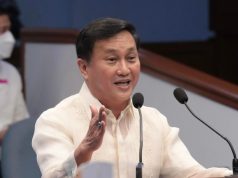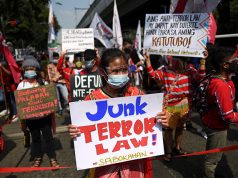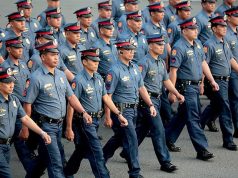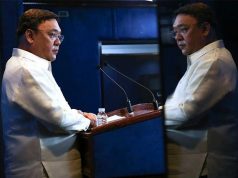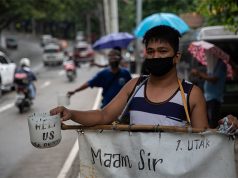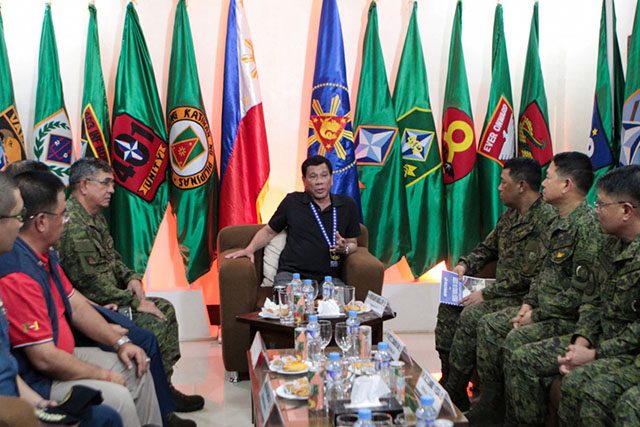
Some legal experts perceived that calls to establish a revolutionary government are illegal and supporters of this could be held liable under the new anti-terror law.
In an assembly staged last Saturday, August 22, a group called Mayor Rodrigo Roa Duterte–National Executive Coordinating Committee, launched the People’s National Coalition for Revolutionary Government and Charter-Change that supported President Rodrigo Duterte’s previous call for a “revolutionary government” until his term ends in 2022.
Duterte had threatened to set this up in 2017 and again in 2019 as a response to alleged ouster plots against him, that have yet to be proven.
This group of avid supporters, meanwhile, gathered at the Clark Freeport in Pampanga on the same historical day that members of the Katipunan tore down their cedulas to signal the start of the 1896 revolution against the Spanish regime.
They also issued a resolution that specified the “powers’ they demanded Duterte should have for a “revolutionary government,” “charter change” and a “presidential-federal-parliamentary system of government.”
However, some of the items provided in the resolution are already redundant with the existing powers Duterte has under the Constitution and tasks government agencies are established to perform.
These include the purging and removal of officials and employees accused of corruption, the creation of commissions for overseas Filipino workers and traffic management, and elimination of drugs and corruption.
Police General Archie Gamboa, chief of Philippine National Police, later confirmed that this group also invited him to a meeting last week via instant messaging app Viber.
Gamboa, however, did not attend the scheduled meeting.
“Yes, I have read it in Viber. It’s supposed to be set yesterday but I am still trying to search for the communication kasi personally hindi pa umabot sa akin,” Gamboa said in an ambush interview Friday.
When reports of this event reached the Palace, presidential spokesperson Harry Roque dismissed it and noted the rights of free speech.
“The call to establish a revolutionary government came from a private group and the organizers are free to publicly express their opinion…The focus, however, of the administration is addressing COVID-19 and mitigating its socioeconomic impact,” Roque said Sunday.
“The most pressing and most urgent concern, which requires the Executive’s full attention, is the gradual opening of the economy while safeguarding the people who are working/going back to work amid the pandemic,” he added.
What revolutionary government may mean
In the Philippines, a revolutionary government or republic is the type of provisional administration created after toppling or ousting a former state leader.
Should Duterte’s supporters push through with this, Constitutional law professor Tony La Viña pointed out that they have to overthrow Duterte out of power.
“Today that means you have to overthrow Duterte, topple him out of power and then install a new government that should not include the current President,” he said in an interview with ABS-CBN.
He also argued that if Duterte supported this movement, he is “automatically” considered resigned from his position.
“The moment Duterte supports a revolutionary government, he is automatically resigned as the President and VP Leni Robredo automatically becomes the President under the 1987 Constitution,” La Viña said.
In a series of tweets, poll commissioner Rowena Guanzon,also a women rights lawyer, likewise quipped that installing Duterte as the head of a revolutionary government is a “joke” and no similar model in the world.
“Creative…there is no model for this anywhere in the world,” Guanzon said.
The joke going around is that some groups are going to topple the government and install the President as head of a revolutionary government . Creative .. there is no model for this anywhere in the world .
— Rowena Guanzon (@rowena_guanzon) August 22, 2020
In a separate tweet with a video clip attached, Guanzon stressed that there would be no election under a revolutionary government.
“Kung mag revolutionary govt kayo walang eleksyon. Yan ang pakialam ko! Demokrasya hindi disgrasya!” she said.
Ano daw ang pakialam ko ? Kung mag revolutionary govt kayo walang eleksyon. Yan ang pakialam ko ! Demokrasya hindi disgrasya ! #BawalAngShunga pic.twitter.com/dRiO9Turs7
— Rowena Guanzon (@rowena_guanzon) August 23, 2020
Lawyer Ronald Mendoza, dean of Ateneo School of Government, also said that the objective of the coalition might be authoritarianism, instead of a revolutionary government.
Usually a revolutionary government involves overthrowing the government. Since that's not your objective, all you're doing is overthrowing democratic checks&balances. What you really want is authoritarianism, not rev-gov.
— Ronald U. Mendoza (@ProfRUM) August 21, 2020
“Usually a revolutionary government involves overthrowing the government,” Mendoza said.
“Since that’s not your objective, all you’re doing is overthrowing democratic checks and balances. What you really want is authoritarianism, not rev-gov,” he added.
A violation of Anti-terror law?
Lawyer John Molo from the University of the Philippines perceived that the members of the MRRD-NECC could be held liable for violations of the Anti-Terrorism Act of 2020.
Molo said that their gathering could fall under Section 4 (c), wherein “acts intended to cause extensive interference with, damage or destruction to critical infrastructure” as among the types of terrorism acts.
Because of the law’s vague definitions, the Constitution which the MRRD-NECC hoped to amend can be considered the “critical infrastructure.”
Integrated Bar of the Philippines president Domingo Egon Cayosa similarly stated this attempt as “repugnant” or “in conflict with the Constitution.”
It also has “no legal, factual, practical or moral basis” for it given the present circumstances.
“A revolutionary government is repugnant to constitutionalism. It should be discouraged and denounced, as we do now. There is no legal, factual, practical or moral basis for a revolutionary government under the present circumstances,” he said.




